Strange & Unusual Taxes Throughout History
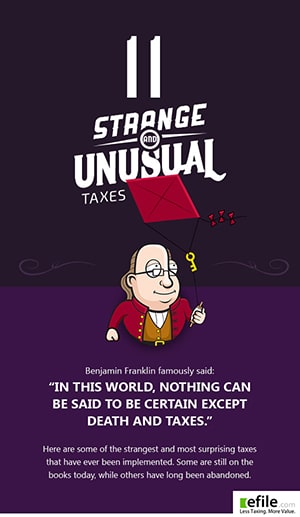
Did you know the IRS specifically asks you to report any income from illegal activities, such as dealing drugs? To be exact, when you file your tax return, the federal tax Form 1040 reports illegal income on Schedule 1 or Schedule C if it is from an illegal self-employment activity. In other words, this is a way of ratting yourself out to the federal government. The IRS considers this income taxable, which is certainly a strange way of collecting income tax. Want to be honest with the IRS? Sign up for a free eFile.com account and report all your taxable income on your current year tax return! We handle all the complicated forms for you and calculate the taxes based on your entries.
Throughout history, there have been many strange, unusual, and weird taxes (read about the history of taxes). Many of them were implemented to raise additional revenue while the purpose of others was to promote social change. Find a list of strange taxes on this page, including one for all 50 states.
Ancient Taxes from Around the World
- In Ancient Egypt, cooking oil was taxed - this "fat tax" is one of the oldest known taxes. People were not allowed to re-use fat or cooking oil alternatives so that they had no choice but to buy it because it was sold only by the Pharaoh's monopoly.
- Pecunia non olet or Money doesn't stink! is a Latin saying. During the 1st century A.D., Roman emperor Vaspasian placed a tax on urine. The buyer(s) of the urine paid the tax. The urine from public urinals was sold as an essential ingredient for several chemical processes, e.g. it was used in tanning (not exactly sure how) and also by launderers as a source of ammonia to clean and whiten woolen togas, etc. Therefore, those who obtained valuable urine from collectors were charged a tax.
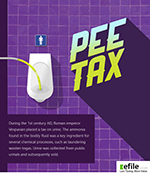
- In Ancient Rome, it was not uncommon for slave owners to free their slaves after a certain number of years of work, and/or the payment of a certain fee. Slaves could pay that fee because many of them had the opportunity to work in several places, and thus could earn the money used to obtain their freedom. The Roman government required the newly freed slave to pay a tax on his or her freedom.
- During the Middle Ages, European governments placed a tax on soap. It remained in effect for a very long time. Great Britain didn't repeal its soap tax until 1835.
- In 1705, Russian Emperor Peter the Great placed a tax on beards, hoping to force men to adopt the clean-shaven look that was common in Western Europe.
- The French had a salt tax called the gabelle, which angered many and was one of the contributing factors to the French Revolution.
- In 1885, Canada created the Chinese Head Tax, which taxed the entry of Chinese immigrants into Canada. The tax lasted until 1923 when a law was passed banning Chinese people from entering Canada altogether with a few exceptions.
- Japan imposed a tax on whiskey which is based on the percentage of alcohol by volume, so Japanese whiskey manufacturers began diluting their product with water to avoid the tax. European whiskey manufacturers were prohibited from doing so; therefore, Japanese whiskey had an advantage in Japan.
Taxes From England

- King Henry I allowed knights to opt out of their duties fight in wars by paying a tax called “scutage" - essentially, a cowardice tax. At first, the tax wasn't high, but then King John came to power and raised it to a rate of 300%. Some claim that the excessive tax rate was one of the things that contributed to the creation of the Magna Carta, which limited the king’s power.
- Oliver Cromwell placed a tax on Royalists, who were his political opponents, taking one tenth of their property. He then used that money to fund his activities that were aimed against the Royalists.
- Playing cards were taxed as early as the 16th century, but in 1710, the English government dramatically raised taxes on playing cards and dice. This led to widespread forgeries of playing cards to avoid paying taxes. The tax was not removed until 1960.
- In 1660, England placed a tax on fireplaces. The tax led to people covering their fireplaces with bricks to conceal them and avoid paying the tax. It was repealed in 1689.
- In 1696, England implemented a window tax, taxing houses based on the number of windows they had. That led to many houses having very few windows in order to avoid paying the tax. Eventually this became a health problem and ultimately led to the tax’s repeal in 1851.
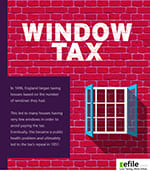
- In the 1700’s, England placed a tax on bricks. Builders soon realized that they could use bigger bricks (and thus fewer bricks) to pay less tax. Soon after, the government caught on and placed a larger tax on bigger bricks. Brick taxes were finally repealed in 1850.
- In 1712, England imposed a tax on printed wallpaper. Builders avoided the tax by hanging plain wallpaper and then painting patterns on the walls.
- England introduced a tax on hats in 1784. To avoid the tax, hat-makers stopped calling their creations "hats", leading to a tax on any headgear by 1804. The tax was repealed in 1811.
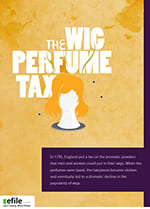
- In 1789, England introduced a tax on candles. People were forbidden from making their own candles unless they obtained a license and then paid taxes on the candles they produced. The tax was repealed in 1831, leading to a more widespread popularity of candles.
- In 1795, England put a tax on the aromatic powders that men and women put on their wigs. This led to a dramatic decline in the popularity of wigs.
- Salt was a very popular thing to tax because consuming it is necessary to humans. The British placed a tax on salt and the salt tax gained worldwide attention when Gandhi staged nonviolent protests against it.
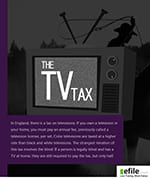
- England has a tax on televisions. If you own a television in your home, you must pay an annual fee, formally called a television license, for each television you own. This money is used to finance programming on the BBC. Color televisions are taxed at a higher rate than black and white televisions. Interestingly enough, if a person is blind an owns a TV in his or her home, he or she still has to pay the tax, but only half of it. Failure to pay this fee is subject to criminal penalties. There were 114,000 convictions and fines in 2019 alone.
State Taxes
Each state with income taxes has or has had at least one strange tax; find an alphabetic list below of some of these highlights.
- Numerous states charge a tax on admissions to racetracks and casinos.
- Despite marijuana being illegal on a federal level and in most states, many states impose taxes on the sale of marijuana.
- In many states, there are “occupancy taxes” for anyone who books a room in a hotel. For example, in Texas, occupancy of any room costing over $15 is taxed at 6% of the room fee.
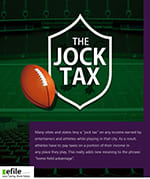
- Many cities and states levy a "jock tax" on any income earned by entertainers and athletes while working in that city. Therefore, athletes have to pay taxes on a portion of their income in any place they play.
- Alabama: like the IRS, Alabama taxes the sale of illegal drugs. Specifically, the state requires sellers to have tax stamps on these sales and those caught without stamps will face jail time for the sale plus prosecution for tax evasion.
- Alaska: captains of the Alaska Eskimo Whaling Commission can deduct up to $10,000 in whaling expenses as a charitable deduction on their federal return.
- Arizona: the state does not tax ice cubes, but taxes the sale of blocks of ice.
- Arkansas: body piercings, pet grooming, and gutter cleaning are all subject to a 6% sales tax.
- California: snuff tobacco is taxed differently depending on its type. Dry snuff is taxed at 256% of its price if it’s $1.70 or more. Moist snuff is taxed at 170% of its price if it’s $1.70 or more. CA also has a tax on vending machine purchases, such as candy or drinks; fresh fruit bought through a vending machine is subject to a 33% tax.
- Colorado: essential food items are tax-free, but straws and cup lids are subject to sales tax because they are considered to be nonessential food items or packaging. Colorado charges all “nonessential packaging” an additional 2.9% in taxes. Save the environment and your money and avoid extra taxes by bringing a reusable mug, or just make your own at home.
- Connecticut: personal protective items are tax exempt to promote public safety. This includes bike helmets, car seats, and firearm safety kits.
- Delaware: the state is able to get by without imposing sales tax because it has very generous corporate fees and taxes - a flat rate of 8.7%. Because of this, many companies do business in the state which generates enough taxes so a sales tax is not needed.
- Florida: the state once had a vaguely worded "greenbelt law" which was abused largely by farmers, property developers, etc. by renting cows to avoid paying taxes. This worked like a "rent-a-cow" scam which was even used by Disney. This law is still in effect, but has been phrased more clearly to limit tax evasion. Also in Florida, a sales tax holiday was created that included items like fanny packs, bowling shoes, school supplies, vests, and a seemingly randomly assembled list of other items.
- Georgia: the state imposed a cap on its rate through a ballot measure, capped at 6%.
- Hawaii: if a tree has historic and/or cultural value, expenses to maintain the tree can be deducted up to $3,000.
- Idaho: purchasing or downloading cloud-based computer software is tax exempt in Idaho as of 2014, excluding digital entertainment (e-books, movies, etc.) if they are to be someone's possession. In other words, streaming or rental is exempt, but buying a digital video game is not.
- Illinois: candy that is prepared with flour, like Twix, is taxed as food at 1%, while candy that is prepared without flour is taxed as candy at 6.25%. Additionally, Illinois also taxes candy, but at a 5% rate on any candy prepared without flour. In Chicago, Soda cans carry a 3% tax, however the syrup used to make fountain soda rings up at 9%, triple the tax rate.
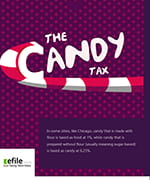
- Indiana has a candy tax as well; marshmallows fall under this tax, however, marshmallow cream does not and is tax free. Marshmallows are considered a candy, but the cream is not.
- Iowa: exempts pumpkins from a sales tax, but only if they will be eaten and not carved or decorated. The states of Pennsylvania and New Jersey also follow this taxation.
- Kansas: untethered hot air balloon rides are exempt from sales tax because they are considered a legitimate form or air transportation. Tethered hot air balloon rides, on the other hand, are considered to be an amusement ride and therefore are subject to sales tax.
- Kentucky: levies a sales tax on thoroughbred stud fees (whether the horses were in the Derby or not).
- Louisiana: annually in September, the state has a Second Amendment sales tax holiday where all hunting supplies, ammunition, and firearms become exempt from state, local, and use taxes.
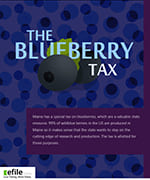
- Maine has special tax on blueberries, a valuable state resource, as well as one on clams as the mahogany quahog tax.
- Maryland: in 2004, the state imposed a tax on residents whose houses are hooked up to sewers leading to treatment plants. Proceeds of $5 a month or $60 a year go to protect the polluted Chesapeake Bay.
- Massachusetts: when traveling into the state and importing alcoholic beverages, a special permit must be completed and fees must be paid to the Commonwealth of Massachusetts Alcoholic Beverages Control Commission.
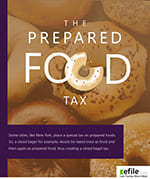
- Michigan: because prepared food is taxed, but unprepared food is not, buying hot popcorn is taxed, but buying a bag of chips is not.
- Minnesota, there was once a special tax on fur or 6.875% plus local taxes.
- Mississippi: for individuals and groups of private nonindustrial landowners, there is a tax credit capped at $10,000 per year that covers up t 50% of the costs for hardwood and pine reforestation with al lifetime limit of $75,000.
- Missouri: the state once charged an annual "bachelor tax" of $1 to single men aged 21 to 50 in order to encourage them to marry in 1820 - this $1 tax would be around $20 today.
- Montana: while purchasing prescribed drugs is a deductible medical expense, purchasing marijuana isn't deductible, even if done with a valid medical marijuana card.
- Nebraska: the state taxes any sales of illegal controlled substances through drug tax stamps, like Alabama.
- Nevada: Las Vegas taxes live entertainment at a rate of 9%. Nevada has many sales taxes, but does not have state income taxes.
- New Hampshire: with no income taxes, the state relies on property taxes which are some of the highest in the country.
- New Jersey: exempts pumpkins from a sales tax, but only if they will be eaten and not carved or decorated, like Pennsylvania and Iowa.
- New Mexico: people over 100 years old are tax-exempt, but only if they are not dependents. The New Mexico “sin tax” extends to all games that rely on CHANCE rather than skill including bingo and raffles.
- New York City: places a special tax on prepared foods, so sliced bagels are taxed once as food and again as prepared food, thus creating a sliced bagel tax.
- North Carolina: the state also taxes illicit substances via tax stamps.
- North Dakota: a musical composition performing tax is imposed of 5% for the sale and licensing for performing rights of said music.
- Ohio: does not tax human organs, blood, bones, or other parts used for transfusing or transplanting, but human hair does see a sales tax.
- Oklahoma: some Oklahoma counties tax personal possessions even if they are not used to generate income as part of the tangible personal property tax.
- Oregon: double amputees get a $50 tax credit. Additionally, recreational marijuana sales tax was reduces from 25% to 17% in 2016, but medical marijuana is still exempt from both state and local sales tax.
- Pennsylvania: Johnstown was devastated by a flood that killed nearly 2,000 people in the late 19th century and, in 1936, another flood damaged the town. That led to the state of Pennsylvania passing a tax on alcohol, the proceeds of which would be used to rebuild the city. By 1942, enough money was raised to rebuild Johnstown, yet the tax exists to this day, and brings in around $200 million a year for Pennsylvania. PA also has a tax on coin-operated vacuum machines at gas stations and Pittsburgh has a 5% amusement tax on anything that offers entertainment or allows people to engage in entertainment.
- Rhode Island: does not tax candy that contains flour since it is considered food, not candy. Additionally, the purchase of a prosthetic device is exempt from taxes.
- South Carolina: hunters who possess a license to operate as a butcher, meat packer, or processing plant may be eligible for a $75 tax credit for each carcass they donate to charity.
- South Dakota: SD's weird tax is that it is the only state without any unusual tax rules - there is no income tax in SD.
- Tennessee: requires drug dealers to anonymously pay taxes on any illegal substances they sold. Additionally, any food not prepared by the seller comes with a 7% sales tax. There is also a tax on all litigation; the amount varies case-by-case, but it can be as low as $1 for a parking violation case. The tax tends to discourage frivolous lawsuits.
- Texas: Christmas tree decoration services are subject to a tax only if the decorator provides the decorations and ornaments. In addition, there is a tax on holiday-themed pictures that are meant to be placed on windows. In 2007 Texas lawmakers imposed a $5 tax on establishments that host live nude shows and also allow alcohol consumption on their premises. Since strip clubs are the businesses that are affected by it, the tax was nicknamed the "pole tax." The revenue from the tax goes to help sexual assault victims and provide health insurance for the poor. The tax was challenged in the Texas Supreme Court on First Amendment grounds, but was upheld in 2011.
- Utah: there is a tax on fees charged by any businesses that have nude or partially nude workers which applies to purchases within the business, including entertainment, food, and drinks.
- Vermont: the city of Burlington may tax specific street performers who receive income for their activities.
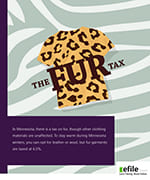
- Virginia: the state has a back-to-school tax holiday, but they also have an odd array of tax free goods during this time, including fur coats, lingerie, wedding apparel, aprons, and corsets.
- Washington: while the state does not have an income tax code today, it once voted on by residents where 70% of voters favored a state income tax.
- West Virginia: there is an additional 12% "safety fee" tax on sparklers; sellers need the Certificate to Sell Sparklers and Novelties.
- Wisconsin is one of the few states that levies a tax on internet access. When dial-up was a popular method of getting online, there was double taxation occurring because phone calls were also taxed.
- Wyoming: candy is tax exempt in this state as well as holiday baskets and gift sets if at least half of the product's value is made up of exempt foods.
- Washington D.C.: gyms and sugary drinks come with a tax of 5.75% for gyms and 8% for drinks.
Other Unusual Taxes
- Some EU nations, such as Denmark and Ireland, began taxing cattle owners for cow ownership via a tax called the Agricultural emissions research levy. First proposed in New Zealand in 2003, the tax aimed to collect revenue in response to farm animals' emission of methane or greenhouse gases. This has come to be referred to as a tax on cow flatulency as cows are a leading cause of global warming due to this. This tax is roughly $18 per cow in Ireland, which can add up on farms or land with dozens of cows.
- The IRS taxes stolen property. The 1040 instructions say that you should report it as stolen property. However, doing that would be self-incrimination, from which we are protected by the Constitution; therefore, one has the option of reporting it as "other income."
- In 2012, there was a controversy after the London Summer Olympic Games about the tax treatment of foreign athletes competing in Great Britain. According to the British tax code, foreign athletes competing in the UK have all their endorsement income taxed, even income originating from other countries and the income is taxed proportionally to the time spent in the UK. This is different from the way many other countries, including the United States, tax foreign athletes. In the United States, only endorsement income of foreign athletes originating from US sponsors is taxed by the IRS. The law was waived by the British government for the duration of the Olympic Games, but it kicked back in after the conclusion of the games. A number of high profile athletes have spoken out against this tax, stating that their tax bill may be bigger than any prize they may receive by winning the competition. The law is often cited by athletes as a reason for choosing to avoid attending competitions in Great Britain.
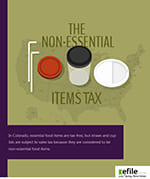
- In 2014, the hit Netflix show, House of Cards, halted filming in the State of Maryland as film tax credits were expected to run out. The show received $11.6 million for its first season and $15 million for its second season. Filming resumed in June 2014. The production team placed House of Cards on hold while waiting for the outcome of two separate bills in the Maryland Legislature. According to the Maryland Film Industry Coalition, film production in the state has a “$400 million impact” on the economy.
Related Tax History Information
While most taxes are not as strange as the ones above, many people have tried to evade taxation entirely. Learn about high-profile tax evasion cases in the United States and around the world.
While some have simply evaded taxes, others have used strange and often incorrect legal and constitutional methods.
Read about unusual tax deductions, unpleasant IRS experiences, and money saving tips for every occasion. See a detailed overview of the tax history in the United States and the world.
Identity theft saw an increase between 2010 - 2016. Learn more about identity theft.
TurboTax® is a registered trademark of Intuit, Inc.
H&R Block® is a registered trademark of HRB Innovations, Inc.